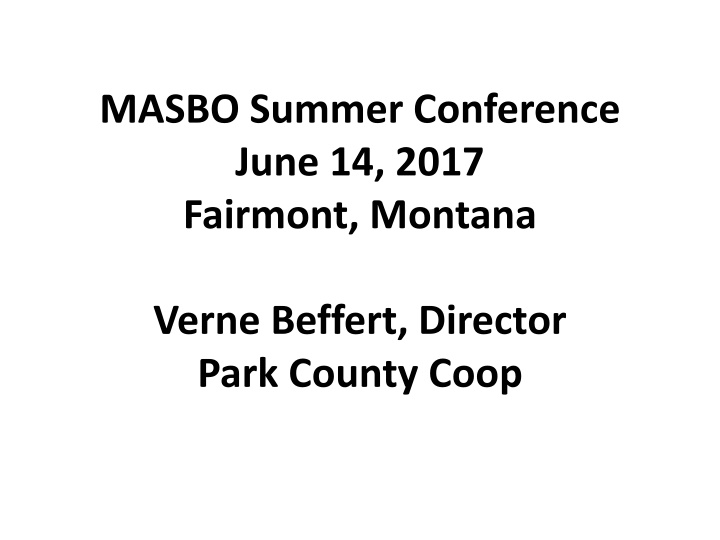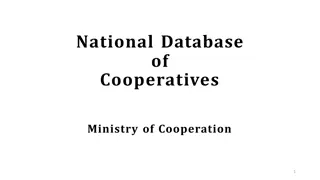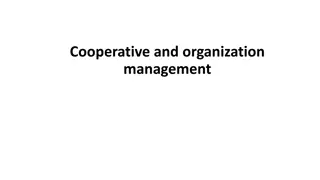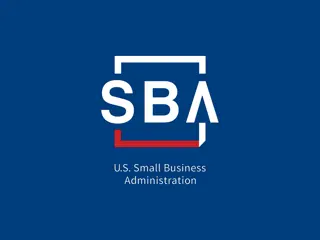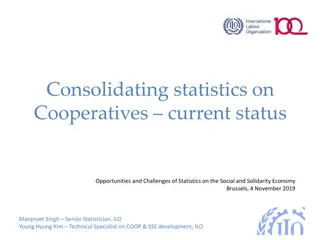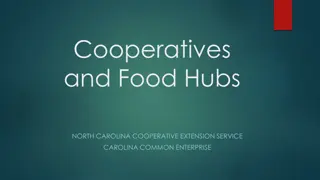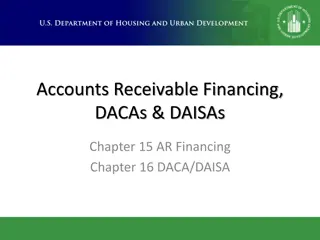Special Education Cooperatives: Overview and Financing
Explore the world of special education cooperatives, their objectives, and the financial aspects involved. Gain insights on accessing specialized services, administrative expertise, and funding opportunities to support member districts efficiently. Delve into topics like revenue sources, budgeting, and educational philosophy guiding cooperative decisions.
Uploaded on Sep 08, 2024 | 0 Views
Download Presentation

Please find below an Image/Link to download the presentation.
The content on the website is provided AS IS for your information and personal use only. It may not be sold, licensed, or shared on other websites without obtaining consent from the author.If you encounter any issues during the download, it is possible that the publisher has removed the file from their server.
You are allowed to download the files provided on this website for personal or commercial use, subject to the condition that they are used lawfully. All files are the property of their respective owners.
The content on the website is provided AS IS for your information and personal use only. It may not be sold, licensed, or shared on other websites without obtaining consent from the author.
E N D
Presentation Transcript
MASBO Summer Conference June 14, 2017 Fairmont, Montana Verne Beffert, Director Park County Coop
Disclaimer The following information should be considered my opinion, as a practical and at times a philosophical approach to the operation of a special education cooperative. For answers to specific compliance questions you will need to visit with specialists from the OPI. Verne
Free Appropriate Public Education IDEA is an Entitlement Program. Child Find activities (children ages 3-18) are required to be conducted at no expense to parents. This could include paying for a medical diagnosis of ADHD. Special Education Children are to be provided services at no cost to parents, which could include nursing services, sign interpreters, assistive technology, paraeducator support Free Appropriate Public Education (FAPE)
What is a Cooperative? The basic reasons for creating a special education cooperative is to: Access services which small districts may not be able to provide on their own. Access administrative expertise specific to special education. Provide a level of insurance . (risk pool, MOE) Be a good neighbor and support member districts who need assistance at any given time.
Interlocal Agreement Many years ago the state provided for the creation of cooperatives to provide services to students who may otherwise not receive appropriate services. Limited to 22 Coops statewide, currently there are 21 Coops. Statutory references: MCA 20-7-451 through 457
Topics Today we will review special education financing with specific focus on Cooperatives. This presentation is intended to provide a broad overview, rather than specific coding information. Revenue Expense Budgeting/Spending/MOE Philosophy Based Decisions
Revenue IDEA Part B & Preschool State Special Education Cooperative Allowable Cost Funding (Instructional Block Grant, Related Services Block Grant, Travel Entitlement, and Administrative/Operations and Maintenance Entitlement) State Quality Educator Payment Reversion (of State Special Education Allocation)
Revenue Continued Required Match (2 options for Coop members) Member District Proportionate Assessment Medicaid
IDEA Part B Generally the single greatest revenue source Annual allocation through OPI Coop receives the allocation of all member districts Reimbursement basis, E-Grant process Direct Deposit must be deposited in interest bearing account Carryover target of 25% to 50% of annual allocation range today is 0 to 100%.
IDEA Part B - Continued Allowable costs salaries, benefits (must follow salary coding), materials, supplies, equipment, travel, professional development (not an all inclusive list). MCA 20-7-431 Cannot be used for retirement bonus, unused sick leave or vacation, uses other than special education
IDEA Preschool Annual allocation through OPI Coop receives allocation for all member districts Reimbursement basis, E-Grant process Direct Deposit must be in interest bearing account How Coops manage this revenue varies
State Revenue Annual allocation through OPI 10 payments per year Instructional and Related Services Block Grants, Admin and Travel Entitlements, Quality Educator Direct deposit, must be deposited in non- interest bearing account Counts toward MOE (Maintenance of Effort)
Reversion Districts that do not spend their state allocation on special education either send the money back to the state, or to the Coop (to avoid reversion to the state). Typically this happens only for small districts who have no special education expenses.
Required Match Districts are required to match the funds paid by the State to the Coop. Option 1 Member districts transfer funds to the Coop (counts toward Coop s MOE) Option 2 The Coop may elect to waive collection of the required match. Member districts provide the Coop a letter affirming the district spent the required match on special education. Counts toward district s MOE.
Assessment Based on the Interlocal Agreement, the Coop may assess member districts for additional revenue (beyond the required match). Typically the assessment would be based on a proportionate basis either special education enrollment or general education enrollment. Based on the past two legislative sessions, you should predict using more general fund money to fund special education services next year.
Medicaid Direct Billing OT, PT, SL, Psych, Transportation, Activities of Daily Living Medicaid Administrative Claiming (MAC) CSCT (Mental Health Services) Coops either contract someone to bill on their behalf or they do their own billing Medicaid expenditures do not count toward MOE.
Tuition Fund While a Coop does not have access to a tuition fund, districts need to understand this funding source which may indirectly effect the Coop. Use of the Tuition Fund for high cost students (Senate Bill 191, 2013 session) Use of the Tuition Fund for placement of students in Residential or Day Treatment facilities, both in- state and out-of-state Foster Children from another district
Tuition Fund - Continued Use of the tuition fund has political implications. Does count towards MOE. May be subject to the legitimate reductions in MOE (retirement of an employee, or loss of a high cost student).
Expense Budgeting Fund 382 should be used almost exclusively for salary expenses to maximize use of the county retirement fund. Remember, benefit costs follow salary expenses for coding purposes. Split salary and benefit costs between funds 315 and 382 so that you can include more people in your MAC reporting. (OT, SL, PT, Admin, Nurse, Counselors, etc.)
Expense Budgeting - Continued Remember that all spending in program 280 counts toward MOE. (Transportation, Tuition, General Fund, Retirement) Do not use Coop funds to pay for expenses that can be paid from other district sources. Examples would include transportation, residential or day treatment placements, high cost students, rather Districts should use their own funds (general fund, Medicaid, or Tuition)
Expense Budgeting - Continued Coops do not have a compensated absence fund you need to carry enough reserves in fund 382 to cover these expenses. (vacation, sick leave, retirement bonus) Develop a plan to cover long term absences by OT, PT, SL, and Psychs you have to provide FAPE even if an employee is on maternity leave, sick leave, etc.
Expense Budgeting - Continued Cash flow you need enough money in fund 382 to cover costs pending approval of your IDEA grant application. Retain 1 year of Medicaid revenue in reserves in case you are audited and have to repay some Medicaid funds. Use Medicaid funds for those services that generated the revenue (OT, PT, SL) for children with Autism, Deafness, or who are Medically fragile.
Expense Budgeting - Continued Medicaid may also be appropriately used for: materials and equipment such as FM systems, Braille materials, Sound field systems, Assistive Technology, Communication devices, Autism programs, resource room remodeling Ensure Medicaid funds are used for expenses you would not be embarrassed to have printed in the newspaper or Facebook.
Expense Budgeting - Continued Develop a budget for Coop Board approval, remember retirement is the only budgeted fund you have. Consider the concept of a risk pool that gives member districts access to Coop funds under certain conditions. Examples transfer students, unanticipated expenses that could not be identified when building district budgets in August.
Budgeting - Transfer of Funds The Coop retains responsibility to prove that funds transferred from the Coop to the District are used for the support of special education services. The Coop and District clerks should agree on a form for appropriate reporting to include CFDA#, etc. See Park Coop example
Budgeting - MOE Communicate with district clerks 1. Prior to August budget adoptions, discuss with each district clerk their required level of MOE for the new budget year. 2. Review MOE expectations with Coop board and district clerks in the fall and early spring. 3. Check Trustees Financial Reports, for each District, in September to ensure the Coop has met MOE. This will give you time to adjust TFS reports if necessary.
Budgeting - MOE Be prepared to help districts apply for a reduction in MOE if they meet the criteria 1. Replacement of a high cost employee with a lower cost employee (usually retirement) 2. High cost student leaves (transfers or graduates). OPI needs specific costs associated with each request
High Risk Practices Risk 1 open enrollment policies. If districts accept out-of-district students, they will not be able to refuse a high cost special education student. The district may look to the Coop for some of the necessary funding. Risk 2 allowing students ages 19-21 to enroll opens the door for special education children to enroll and to be provided FAPE with the attenuating costs of service, with NO ANB.
Philosophy Based Decisions District and Coop split costs for access to the risk pool holds the district responsible yet provides some relief. If Coop funds are used to provide professional development for district employees, consider a split Coop pays registration, District pays transportation, meals, motel. Be sure Districts have some skin in the game .
Philosophy Based Decisions Districts have access to the risk pool for unanticipated expenses with the expectation that the following year the district includes the cost of the student in their budget. Base decisions on the amount of carryover and reserves on solid rationale cash flow, risk pool, compensated absence liabilities, student enrollment growth.
Philosophy Based Decisions Code special education expenses to special education rather than playing games to keep expenses as low as possible to meet the minimum required (MOE). Correct coding to reflect actual special education costs (personnel, transportation, supplies, technology, tuition, Medicaid, etc.)
Closing Statement The Cooperative Clerk has a unique responsibility to develop a working relationship with district clerks and to assist district clerks understand the unique aspects of funding services for special education children. MOE Transfer of Funds Access to Risk Pool
